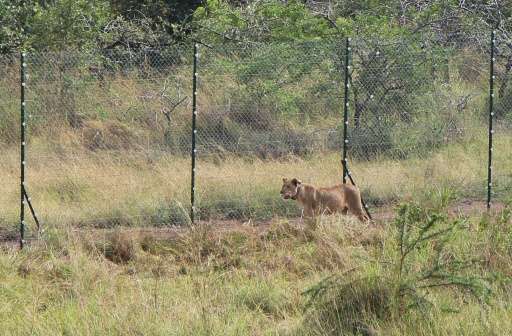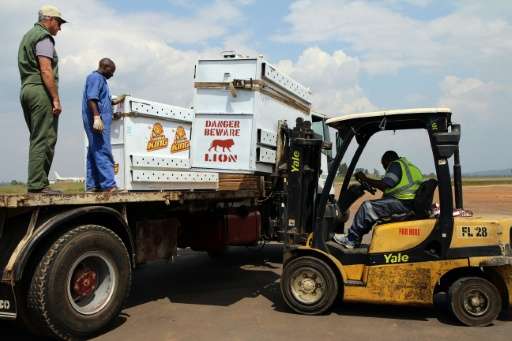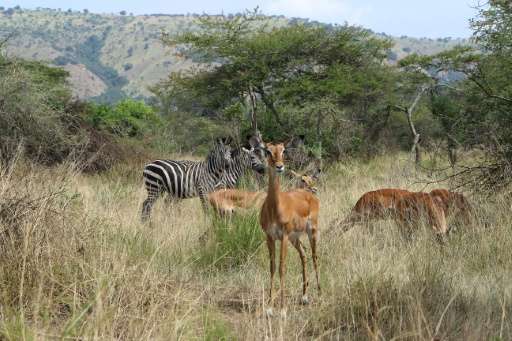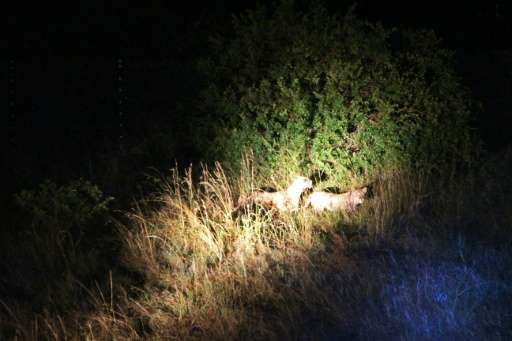Roaring success: lions return to Rwanda, with rhinos next?

Groggy on their paws after waking from tranquillizers, lions have returned to Rwanda for the first time since the endangered animal was wiped out following the country's 1994 genocide.
Seven lions—two males and five females—were transported in a marathon 30-hour journey from South Africa - first by air, then the final stretch by road to Rwanda's eastern Akagera National Park.
Schoolgirls sang outside the park in Akagera, a 112,000-hectare (276,800-acre) park bordering Tanzania, welcoming the predators as they ended their journey.
One by one, they were released into a giant pen - where they will stay for initial quarantine of around two weeks, before being allowed out into the wild of the park itself.
"It is a huge conservation milestone, it is a beginning of a fantastic chapter for lions in Rwanda," Akagera park director Jes Gruner said.
Lions in Rwanda were stamped out in the years following the 1994 genocide, which left an estimated 800,000 people dead.
Fleeing refugees and displaced people occupied part of the park, with the lion being driven out or killed as people tried to protect their livestock.
"I still have the pictures of the last three lions that were poisoned... it was very sad," said vet Tony Mudakikwa.

So the return of lions symbolises more than a conservation success.
"We are excited as a nation," said Yamina Karitanyi, head of tourism at the Rwanda Development Board. "We are proud to welcome the lions."
Some two hours by vehicle from the capital Kigali, it is an important tourist destination, with some 28,000 visitors in 2014, and the return of the lions is hoped to give an important boost.
Much preparation was needed: the park is ringed with electric fencing, and the cats are equipped with satellite collars to reduce the risk of them entering inhabited areas.
- Rhinos next?-
"Of course, a lion can kill a cow, but now that there is the fence there is less risk," said cattle herder Phocus Rukundo. "The people can no longer kill the lions because they understand the importance of their conservation for tourism."
Still, much work was needed to persuade people living nearby that the return of the top predator should be welcomed.

"I am sure there are still people nervous about it," Sarah Hall said, in charge of tourism for Africa Parks, a conservation group which works in Akagera.
Educational plays were put on for communities bordering the park, as well as a football tournament called "The Lion King", Hall said, adding that five percent of park income in Rwanda was donated to community projects, such as funding schools or health centres.
The lion remains listed as vulnerable at a global level, the International Union for the Conservation of Nature (IUCN) said last month in an update to its "Red List" of threatened species.
The IUCN warns that trade in bones and other body parts for traditional medicine in Africa and in Asia is a new and emerging threat to the species.

But Akagera offers a safe space, with plenty of food for the top predator, and is home to multiple antelope species, buffaloes, giraffes and zebras, as well as leopards and elephants.
Park officials are now working to reintroduce rhinos in Akagera.
"Without the lions, it was as if I had just a hand with three fingers, now I have four," said park official Eugene Mutangana. "With rhinos, my hand is complete."
© 2015 AFP





















